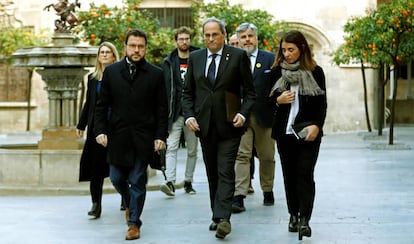Spain’s Foreign Ministry approves reopening of Catalan ‘embassies’
The move marks a change in strategy on the part of the central government, and comes after dialogue between Madrid and Barcelona over the relevant decrees

The new Spanish government, led by the Socialist Party Prime Minister Pedro Sánchez, is changing strategy on one of the key points of conflict in recent years with the regional administration in Catalonia: the work carried out by the so-called “Catalan embassies.”
The move signals a new era in relations between Catalonia and the central administration
The Foreign Ministry has given its approval to the reopening of three of these delegations, which were originally challenged by the central government and subsequently frozen by the justice system. The new approach from Madrid has come given that the Catalan regional government has reformulated its objectives with these embassies, leading the ministry to conclude that their work will not interfere with Spanish foreign policies.
Last Tuesday, the Catalan government – the Generalitat, as it is known – approved three decrees to reopen the embassies in Argentina, Mexico and Tunisia, after they had been shut by the Catalan regional High Court.
But far from being a challenge for the new Socialist-Unidas Podemos coalition government in Madrid, the move has signaled a new era in relations between the northeastern Spanish region and the central administration in Madrid. The decrees were approved by the Foreign Ministry, which had previously revised the legislation and had introduced several modifications, according to ministry sources.
The dialogue between the two administrations is in contrast to the tensions that have dominated in recent years in response to the secessionist drive in Catalonia, which reached its peak in 2017 when an illegal referendum was held followed by a subsequent unilateral declaration of independence. This new phase of discussions is being sought by PM Sánchez, who had to make a deal with the pro-independence Catalan Republican Left (ERC) party on talks on the future of the region in exchange for their key abstention at his investiture vote.
Under the previous leadership of Josep Borrell, the Foreign Ministry had taken a hard line against the Catalan embassies, on the basis that they were damaging Spain’s interests abroad. “They are being used as a fundamental instrument to promote the secessionist narrative and to damage the international image of Spain,” the minister argued at the time.
The new approach will also, for now, cancel out the judicial element of the issue. Having rewritten the decrees to reopen the three delegations, the suspension and the appeal against them will no longer apply, according to the interpretation of the Foreign Ministry. The deal between the PSOE and ERC specifically referred to “overcoming the judicialization” of the conflict.
One of the major objections of the ministry regarding the embassies was the term that the Generalitat used to refer to its contacts with other states where they were opened. The Catalan foreign department referred to “bilateral relationships” between Catalonia and the countries in question, an expression that interfered with the exclusive competencies of the Spanish state in this area.
Sources consulted for this story have not clarified whether the term “bilateral” has been used again, but they said that the changes suggested in the decrees were in that direction.
English version by Simon Hunter.
Tu suscripción se está usando en otro dispositivo
¿Quieres añadir otro usuario a tu suscripción?
Si continúas leyendo en este dispositivo, no se podrá leer en el otro.
FlechaTu suscripción se está usando en otro dispositivo y solo puedes acceder a EL PAÍS desde un dispositivo a la vez.
Si quieres compartir tu cuenta, cambia tu suscripción a la modalidad Premium, así podrás añadir otro usuario. Cada uno accederá con su propia cuenta de email, lo que os permitirá personalizar vuestra experiencia en EL PAÍS.
¿Tienes una suscripción de empresa? Accede aquí para contratar más cuentas.
En el caso de no saber quién está usando tu cuenta, te recomendamos cambiar tu contraseña aquí.
Si decides continuar compartiendo tu cuenta, este mensaje se mostrará en tu dispositivo y en el de la otra persona que está usando tu cuenta de forma indefinida, afectando a tu experiencia de lectura. Puedes consultar aquí los términos y condiciones de la suscripción digital.








































